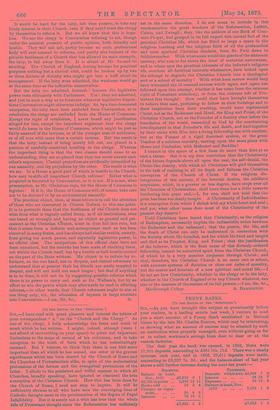[TO TRH EDITOR OF THS"SPECTATOR."] SIR,—I have read with great
pleasure and interest the letters of your correspondent "A." on the "Church and the Clergy." As one of the clergy, I fully acknowledge the force and truth of much which he has written. I might, indeed, attempt (were I not afraid of encroaching on your space) to point out important limitations to the scope of several of his criticisms, and to take exception to the truth of facts which he has unhesitatingly assumed. But I venture to think that there is one blot more important than all which he has named, one error of the gravest significance which has been shared by the Church of Rome and the Churches of Protestantism alike, in spite of the ecclesiastical pretensions of the former and the evangelical pretensions of the latter. I allude to the persistent and wilful manner in which all Churches, broadly speaking, have ignored or obscured the true conception of the Christian Church. How this has been done by the Church of Rome, I need not stop to inquire. It will be sufficiently obvious to all who have seen the converging lines of Catholic thought meet in the proclamation of the dogma of Papal Infallibility. But it is surely not a whit less true that the whole tide of Protestant thought since the Reformation has uniformly set in the same direction. I do not mean to include in this condemnation the great teachers of the Reformation, Luther, Calvin, and Z wingli ; they, like the authors of our Book of Com- mon Prayer, had grasped in its full import this central fact of the practical Christian life, which has filled so large a space in the religious teaching and the religious faith of all the profoundest and most spiritual Christian thinkers, from St. Paul down to Schleiermacher. With what scorn would the giants of the sixteenth century, who rose so far above the level of sectarian narrowness, and in whose eyes the practical interests of the believer's religious life overbore all doctrinal interests whatsoever, have looked upon the attempt to degrade the Christian Church into a theological sect or a school of morality ! With what keen sorrow would they have witnessed the ill-omened success which again and again has followed upon this attempt, whether it has come from the extreme right of Protestant orthodoxy, or from the extreme left of Pro- testant free thought ! How could they have brought themselves to believe that men, professing to follow in their footsteps and to draw inspiration from their teaching, would have represented Christ, not as the Redeemer and Head, the King and Priest, of the Christian Church, not as the Founder of a Society elect before the foundation of the world, reconciled to God by the constraining: love displayed in that Founder's life and death, and knit together by their union with Him into a living fellowship one with another,, but as the Framer of a rigid doctrinal system, or the great Teacher of a sublime morality, moving upon the same plane with, Moses and Confucius, with Mahomet and Buddha!
I cannot in the space of a few lines do more than hint at so- vast a theme. But it is my firm conviction that the Christianity of the future depends above all upon the zeal, the self-denial, the Christ-like charity, with which all Christians will gird themselves to the task of realising in all its depth and fullness the Christian conception of the Church of Christ. If the religions dis- integration of this century, if the feverish doubts, the nihilistic: scepticism, which, in a greater or less degree, have crept over all the Churches of Christendom, shall have done but a little towards- furthering this great end,—I, for one, shall not hold that the prize has been too dearly bought. A Christianity of Individualism> is a conception from which I shrink with my whole heart and soul ;. and yet, what other name does most of the Christianity of the present day deserve ?
Until Christians have learnt that Christianity, as the religion of Redemption, necessarily implies the indissoluble union between, the Redeemer and the redeemed ; that the person, the life, and the death of Christ can only be understood in connection with the Society which He founded, and for which He lived and taught and died as its Prophet, King, and Priest ; that the justification of the believer, which is the final cause of this divinely-ordered fellowship, cannot be conceived apart from the Christian Church,. of which he is a very member corporate through Christ ; and that, therefore, the Christian Church is no mere sect or school,. with accurate systems of doctrine or clear-cut codes of morality, but the source and fountain of a new spiritual and moral life,—I. do not see how Christianity, whether in the clergy or in the laity, whether in the Church of England or in any Church whatever, can rise to the measure of the stature of its fall powers.—I am, Sir, &c.,.


































 Previous page
Previous page